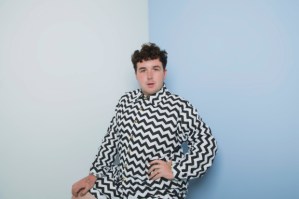Review: Bravado (Dover Road Sports and Social Club, Folkestone)
Scottee’s latest piece is a memoir of working class masculinity which plays in non-theatre spaces across the UK
Scottee is absent from his latest autobiographical show. Bravado – "a memoir of working class masculinity, 1991-1999" – is a text written to be read by a volunteer. It tours into typically masculine spaces: rugby changing rooms and lap dancing clubs. In Folkestone, it plays in a working men’s club – not in the unvarnished bar, with its fruit machines and dart boards, but in the boxing gym upstairs in the loft.
There, the smell of sweat has soaked in deep. The walls are painted red – for décor or aggression? They’re covered in posters of bare-chested champs. One roars out of the ring with everything clenched. Six punchbags hang in two rows – leathery brown or boastful in gold. Headguards spill out over every surface. A soft-spoken young man in a pink vest steps up. The boxing ring, this evening, has been transformed into a stage.
As three televisions regurgitate nostalgic nineties TV, everything from Gladiators to Gulf War footage via the Mitchell brothers, Scottee serves up a series of coming-of-age memories – encounters with masculinity from his childhood in Camden. There are fist-fights and banter that tips into bullying, secretive sexual encounters and domestic abuse dished out by his drunk father. The stories are spliced with Oasis sing-a-longs.
The four texts – Blood, Spit, Tears and Cum – trudge up painful memories. All are sour with violence, and some are more raw than others. They’re written with a vivid simplicity and an eye for harsh details – images that stick in the mind which, looking back, seem all the more telling. The bully who protects his temples with his fighting is, it’s obvious, a kid that’s been taught how to fight; the coercive blow jobs in bin-stores are a symptom of shame. One tracks through the thought process of facing abuse – the logic that detaches his dad from the drunk; the empathy that recognises what made the man thus.
The images of men throb with a pack mentality, perhaps even cowardice, but definitely a lack of imagination or expression. Oasis supply all that by rote, their anthemic lyrics somehow burnished and melancholic. The televisions pump conditioning via the World’s Strongest Man and Street Fighter Two. You don’t grow into a man. You’re knocked into shape.
The form helps and hinders. While the volunteer’s presence lets us off the hook, it knocks the polish of what could seem like sob stories. The act of volunteer is itself one of bravado, but here laced with generosity and vulnerability – an admission that such traits have their place. It raises another question: Where’s Scottee? Is his absence a refusal to relive these memories or return to these spaces? It asks how much these tales tell us about him, and what sort of man we envisage him to be. They move from typically laddish tales to something else, gradually revealing the author’s effeminacy and otherness, placing those characteristics on his temporary stand-in.
It works in theory, less so in practice. It’s problematic, for instance, that none of Dover Road’s regulars seem to have come – even to a show at their local. Instead, an artsy corwd of asymmetric haircuts sit around in their space – interlopers and voyeurs poking their heads in. That feels like appropriation – the working men’s club as an artsy, site-specific safari – but perhaps its that an invitation’s not been taken up. Instead, it feels like a kind of occupation, re-purposing a space where masculinity dominates. Isn’t that just another kind of bravado?
Bravado tours the UK until 17 November.














